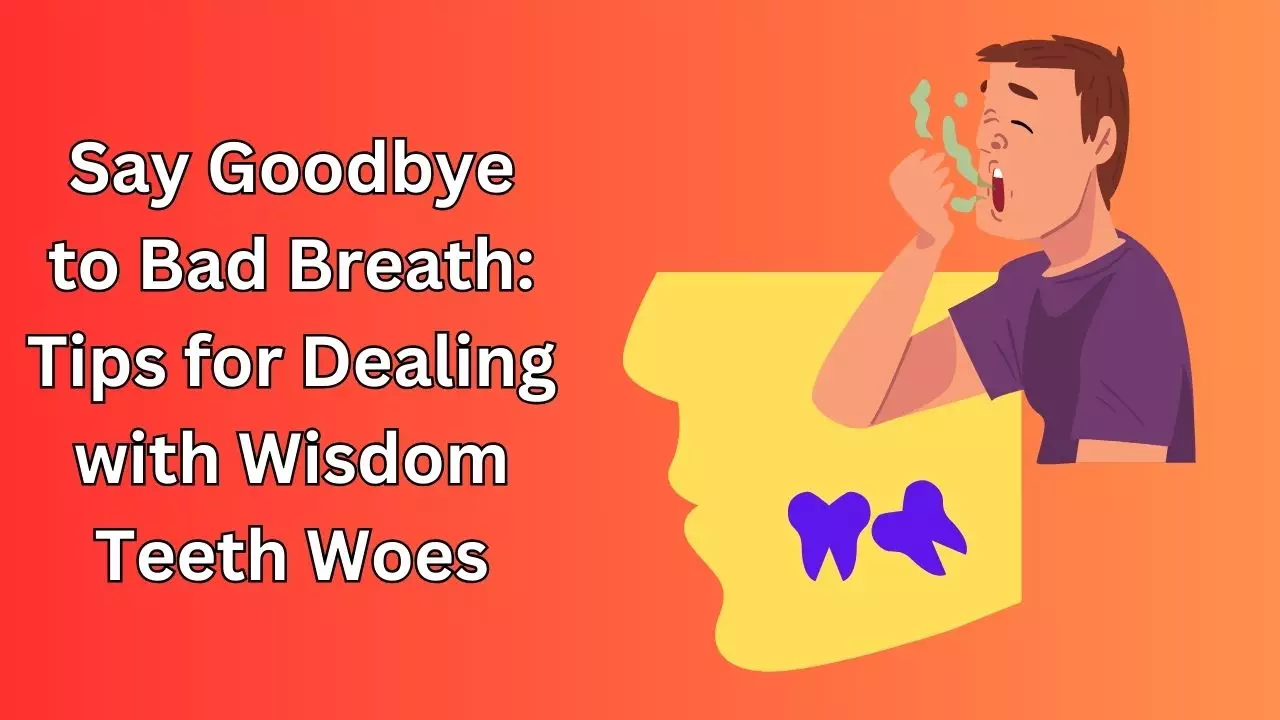
- The Causes of Bad Breath from Wisdom Teeth
- Signs and Symptoms of Wisdom Teeth Problems
- How to Prevent Bad Breath from Wisdom Teeth
- Home Remedies for Bad Breath from Wisdom Teeth
- Over-the-Counter Products for Bad Breath from Wisdom Teeth
- The Role of Oral Hygiene in Managing Bad Breath from Wisdom Teeth
- Professional Dental Treatments for Wisdom Teeth-Related Bad Breath
- The Importance of Regular Dental Checkups for Wisdom Teeth Health
- When to Consider Wisdom Teeth Extraction for Bad Breath Relief
- Achieving Fresh Breath and Optimal Oral Health with Wisdom Teeth Care
Wisdom teeth, also known as third molars, are the last set of teeth to emerge in the mouth. They typically appear between the ages of 17 and 25. While some people have no issues with their wisdom teeth, others may experience problems such as pain, infection, and bad breath.
Bad breath, also known as halitosis, is a common oral health issue that affects many people. It can be embarrassing and can have a negative impact on one’s self-esteem and social interactions. Bad breath can be caused by a variety of factors, including poor oral hygiene, certain foods, smoking, dry mouth, and underlying health conditions.
The Causes of Bad Breath from Wisdom Teeth
Wisdom teeth can contribute to bad breath due to several reasons. One of the main causes is bacteria buildup and infection. When wisdom teeth start to emerge, they often do not have enough space in the mouth to fully erupt. This can lead to partial eruption or impaction, where the tooth is trapped beneath the gum line.
The partially erupted or impacted wisdom teeth create pockets where food particles and bacteria can accumulate. These pockets are difficult to clean properly with regular brushing and flossing, leading to bacterial growth and the release of foul-smelling gases that cause bad breath.
In addition to bacteria buildup, wisdom teeth can also cause bad breath if they become infected. Infection can occur when bacteria enter the gum tissue surrounding the wisdom tooth. This can result in swelling, pain, and an unpleasant odor.
Signs and Symptoms of Wisdom Teeth Problems
There are several signs and symptoms that may indicate problems with wisdom teeth. These include:
1. Pain or discomfort in the back of the mouth: This is a common symptom of wisdom teeth eruption or impaction. The pain may be intermittent or constant and can radiate to other areas of the mouth and face.
2. Swelling and redness: Inflammation and swelling around the wisdom tooth area can indicate infection or impaction.
3. Bad breath: As mentioned earlier, bad breath can be a sign of wisdom teeth problems. The accumulation of bacteria and food particles in the pockets around the wisdom teeth can cause an unpleasant odor.
4. Difficulty opening the mouth: Impacted wisdom teeth can cause limited jaw movement and difficulty opening the mouth fully.
5. Headaches and earaches: Wisdom teeth problems can sometimes cause referred pain to the head and ears, leading to headaches and earaches.
How to Prevent Bad Breath from Wisdom Teeth
Preventing bad breath from wisdom teeth involves maintaining good oral hygiene practices and taking steps to reduce bacteria buildup. Here are some tips to prevent bad breath from wisdom teeth:
1. Brush and floss regularly: Brush your teeth at least twice a day, using a soft-bristled toothbrush and fluoride toothpaste. Floss daily to remove food particles and bacteria from between your teeth and along the gum line.
2. Clean your tongue: Use a tongue scraper or brush to clean your tongue regularly. Bacteria can accumulate on the surface of the tongue, contributing to bad breath.
3. Rinse with an antibacterial mouthwash: Use an antibacterial mouthwash after brushing and flossing to kill bacteria in your mouth and freshen your breath.
4. Stay hydrated: Drink plenty of water throughout the day to keep your mouth moist and wash away food particles and bacteria.
5. Avoid tobacco products: Smoking or using other tobacco products can contribute to bad breath. Quitting smoking can improve your oral health and freshen your breath.
Home Remedies for Bad Breath from Wisdom Teeth
In addition to practicing good oral hygiene, there are several home remedies that can help alleviate bad breath caused by wisdom teeth problems:
1. Saltwater rinses: Rinse your mouth with warm saltwater to reduce inflammation and kill bacteria. Mix half a teaspoon of salt in a glass of warm water and swish it around your mouth for 30 seconds before spitting it out.
2. Herbal mouthwashes: Some herbal mouthwashes, such as those containing tea tree oil or peppermint oil, can help freshen your breath and kill bacteria.
3. Chewing on herbs: Chewing on fresh herbs like parsley, mint, or cilantro can help mask bad breath and provide a temporary fresh scent.
4. Oil pulling: Oil pulling involves swishing a tablespoon of coconut oil or sesame oil in your mouth for 10-15 minutes before spitting it out. This can help remove bacteria and toxins from your mouth and improve breath odor.
5. Baking soda paste: Mix baking soda with water to create a paste and brush your teeth and tongue with it. Baking soda can help neutralize odors and kill bacteria.
Over-the-Counter Products for Bad Breath from Wisdom Teeth
There are several over-the-counter products available that can help alleviate bad breath caused by wisdom teeth problems:
1. Mouthwashes: Look for mouthwashes that are specifically formulated to combat bad breath. These mouthwashes often contain antibacterial ingredients that kill bacteria and freshen breath.
2. Breath mints and gum: Sugar-free breath mints and gum can help mask bad breath temporarily. Look for products that contain xylitol, as it can help reduce bacteria in the mouth.
3. Tongue scrapers: Tongue scrapers are small tools designed to remove bacteria and debris from the surface of the tongue. Using a tongue scraper regularly can help improve breath odor.
4. Oral irrigators: Oral irrigators, also known as water flossers, use a stream of water to clean between teeth and along the gum line. They can be effective in removing food particles and bacteria from hard-to-reach areas.
The Role of Oral Hygiene in Managing Bad Breath from Wisdom Teeth
Maintaining good oral hygiene practices is crucial in managing bad breath caused by wisdom teeth problems. Regular brushing, flossing, and tongue cleaning can help remove bacteria and food particles from the mouth, reducing the risk of bad breath.
Brush your teeth at least twice a day for two minutes each time, using a soft-bristled toothbrush and fluoride toothpaste. Pay special attention to the back of your mouth where the wisdom teeth are located. Use gentle, circular motions to clean all surfaces of your teeth.
Flossing is equally important in removing plaque and food particles from between your teeth and along the gum line. Be sure to floss gently to avoid injuring your gums.
Cleaning your tongue is also essential in managing bad breath. Bacteria can accumulate on the surface of the tongue, contributing to foul odors. Use a tongue scraper or brush to clean your tongue daily, starting from the back and moving forward.
Professional Dental Treatments for Wisdom Teeth-Related Bad Breath
If home remedies and over-the-counter products are not effective in managing bad breath caused by wisdom teeth problems, it may be necessary to seek professional dental treatments. Here are some options that your dentist may recommend:
1. Deep cleaning: If there is a buildup of plaque and tartar around the wisdom teeth, a deep cleaning procedure called scaling and root planing may be necessary. This involves removing plaque and tartar from the tooth surfaces and smoothing out the roots to prevent further bacterial growth.
2. Antibiotics: If there is an infection present, your dentist may prescribe antibiotics to help clear the infection and reduce inflammation.
3. Wisdom tooth extraction: In cases where the wisdom teeth are causing persistent problems, extraction may be necessary. Wisdom tooth extraction can alleviate pain, prevent further infection, and eliminate bad breath caused by bacteria buildup.
The Importance of Regular Dental Checkups for Wisdom Teeth Health
Regular dental checkups are essential for maintaining optimal oral health, including the health of your wisdom teeth. Your dentist can monitor the development and eruption of your wisdom teeth and identify any potential problems early on.
During a dental checkup, your dentist will examine your mouth, including the wisdom teeth area, and may take X-rays to get a better view of the teeth and their positioning. This can help determine if there are any issues with the wisdom teeth that need to be addressed.
Regular dental checkups also allow your dentist to provide professional cleanings to remove plaque and tartar buildup, reducing the risk of bad breath and other oral health problems.
When to Consider Wisdom Teeth Extraction for Bad Breath Relief
In some cases, wisdom teeth extraction may be necessary to relieve bad breath caused by wisdom teeth problems. Your dentist may recommend extraction if:
1. The wisdom teeth are impacted or partially erupted and causing pain or discomfort.
2. There is a recurrent infection or inflammation around the wisdom teeth.
3. The wisdom teeth are causing crowding or shifting of other teeth.
4. There is a risk of damage to adjacent teeth or structures.
Wisdom tooth extraction can alleviate pain, prevent further infection, and eliminate bad breath caused by bacteria buildup. Your dentist will evaluate your specific situation and recommend the best course of action.
Achieving Fresh Breath and Optimal Oral Health with Wisdom Teeth Care
In conclusion, wisdom teeth can contribute to bad breath due to bacteria buildup and infection. It is important to practice good oral hygiene, including regular brushing, flossing, and tongue cleaning, to prevent bad breath from wisdom teeth problems.
Home remedies such as saltwater rinses and herbal mouthwashes can help alleviate bad breath temporarily. Over-the-counter products like mouthwashes, breath mints, and tongue scrapers can also provide relief.
If home remedies and over-the-counter products are not effective, professional dental treatments such as deep cleaning and wisdom tooth extraction may be necessary.
Regular dental checkups are crucial in maintaining wisdom teeth health and preventing problems. Your dentist can monitor the development of your wisdom teeth and recommend appropriate treatments if needed.
By taking care of your wisdom teeth and practicing good oral hygiene, you can achieve fresh breath and optimal oral health. Don’t let bad breath from wisdom teeth hold you back from smiling confidently and enjoying a healthy mouth.









